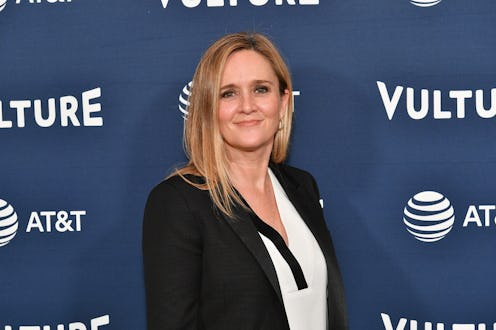Entertainment
Why ‘Full Frontal With Samantha Bee’ Would Be Way Less Funny If Its Writers Weren’t So Diverse

The most unique voice in the late-night show lineup is Full Frontal With Samantha Bee — and that's not just because Samantha Bee is the only female host to currently occupy the space. At New York City's 2018 Vulture Festival, Bee discussed the importance of having a diverse staff on Full Frontal With Samantha Bee. Contributors Ashley Nicole Black, Allana Harkin, Amy Hoggart, Mike Rubens, and Melinda Taub joined Bee at the May 20 event, and they echoed that having a group of people from a variety of backgrounds behind-the-scenes and in front of the camera allows the show to tackle stories — and make jokes — that other shows can't.
The panel's moderator Rebecca Traister said that she had spoken to Bee before Full Frontal premiered in 2016 about her "commitment to having creators, writers, producers, correspondents who were not just white guys." As Traister reported in her 2016 New York magazine article, a thoughtful hiring process led to a Full Frontal writing staff that is 50 percent female and 30 percent non-white. Rolling Stone pointed out that these numbers reflect the makeup of America, but they are rare in the entertainment industry and — as Bee noted at Vulture Fest — in many industries. And creating a workforce that contains people with different perspectives is something that Bee says Full Frontal is focused on even in its third season.
"It is essential for us," Bee said at Vulture Fest. "I don't think that we've solved all the problems of the world and I don't think we've solved all the problems of diversity. It's an ongoing concern for us. It's something we think about all the time. I think we can do better. I think we should do better. We're always trying to do better. It's in our heads all the time."
Bee also said that this writing staff adds to the quality of the TBS show. "It makes the show better," Bee said. "Without different voices and without being a collaborative process where everybody's pitching, it would be a very different type of show."
Traister also mentioned that Bee had writers whose families were affected by the travel bans President Donald Trump tried to institute that targeted nations with Muslim majorities. "People in our office have skin in the game and that's just essential for a tonight show like this," Bee said. "And also just essential in every workplace. I actually would prefer to extrapolate to the rest of the world. It's essential in every workplace. It's just not being done in every workplace."
Full Frontal correspondent Black, who was the only person of color on the panel, also noted the importance of having more than just one person representing a group of people. "I think a lot of workplaces are really happy with like, 'We got a gay. We're done,'" Black said. "But like when you have one — and I have been many times — when you're the one person, it's so hard to speak up and say, 'We're looking at this wrong, we need to look at it another way when you're the only voice. But on our show, there's a lot of us ... you don't have to be the only one. And I think what gets lost in conversation with a lot of shows, they hire one woman and they're like, 'We did it.' You really didn't."
Bee agreed that it's intimidating "if you're the junior person — that staff writer — or you're the only woman on a big show of men." Bee said, "It's difficult to be that person who stands up and is the harpy of the room. It's hard to do that, really really hard to do that." Since "harpy" is a disparaging term usually aimed at outspoken women, Bee clarified that all of her staff can be considered harpies for how they speak their mind. "Even Mike's a harpy," Bee said. Rubens was the only man representing the Full Frontal team at Vulture Fest. "We have a lot of men who work on our show," Harkin said, then joked, "We just only allow one on a panel."
The writing staff's diversity also helps when crafting the jokes that are essential to Full Frontal and the show's take on the news. "It really shapes the voice of the show too. To sort of have a forum [of like-minded writers] to talk to," Traub said. "Like Ashley and I get each other's Gilmore Girls jokes." Black added, "When there's two of you, you can say, 'I vouch for that joke.'"
At the end of the day, Bee recognizes that with its weekly format, Full Frontal has the opportunity to cover the news in a way that shows like her former employer, The Daily Show, can't. "Our show has a different role to play than other late night shows from my perspective," Bee said, because they don't have to be as reactionary to breaking news as nightly shows. "We synthesize things differently with a little bit more time with stories," she continued.
But varying formats aside, Bee and her correspondents made it clear at the panel that a more diverse staff leads to a richer product. And there's no excuse for any employer not to recognize that and to make strides to do better when it comes to a more well-rounded workforce, just as Full Frontal continues to do.